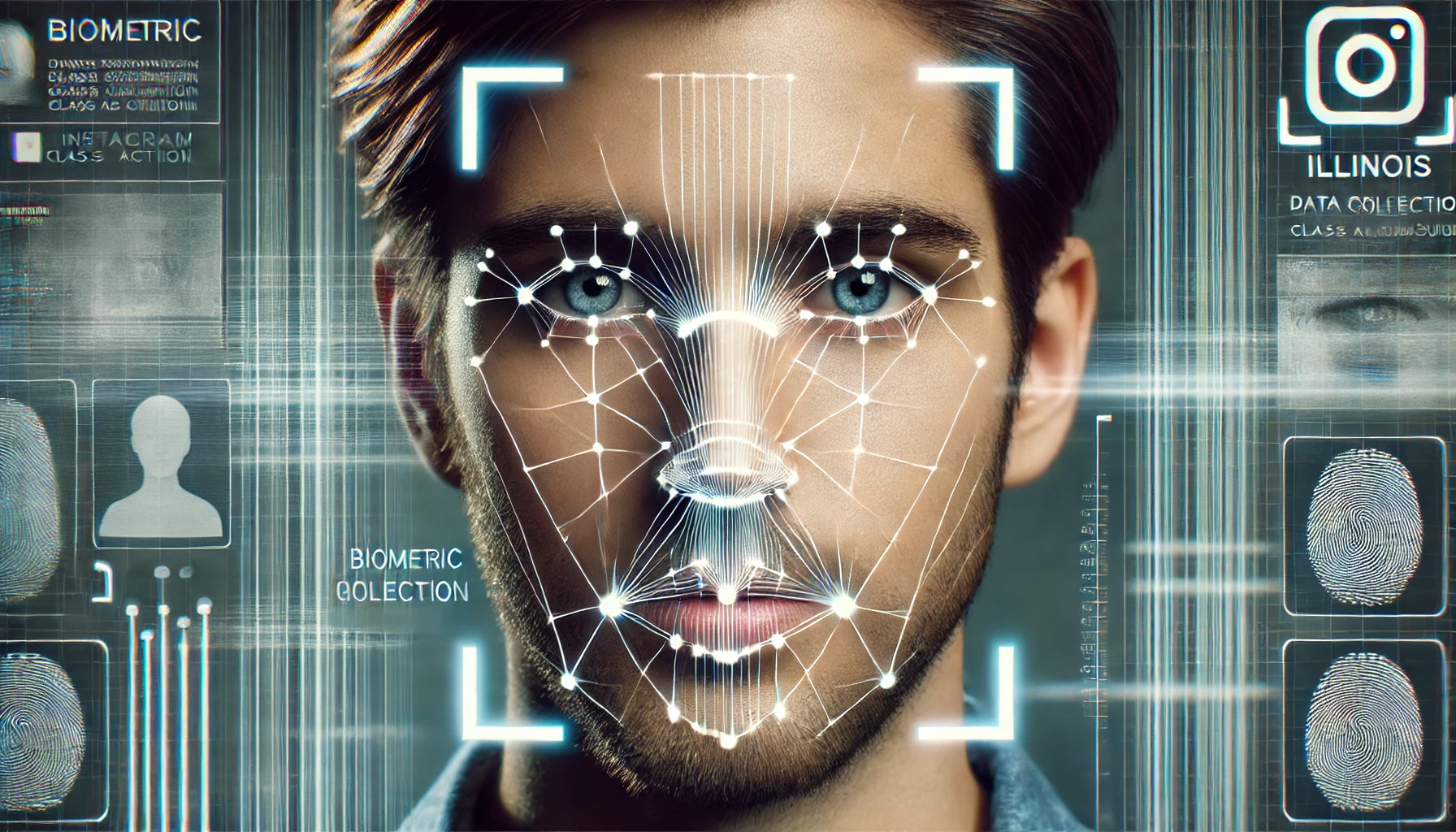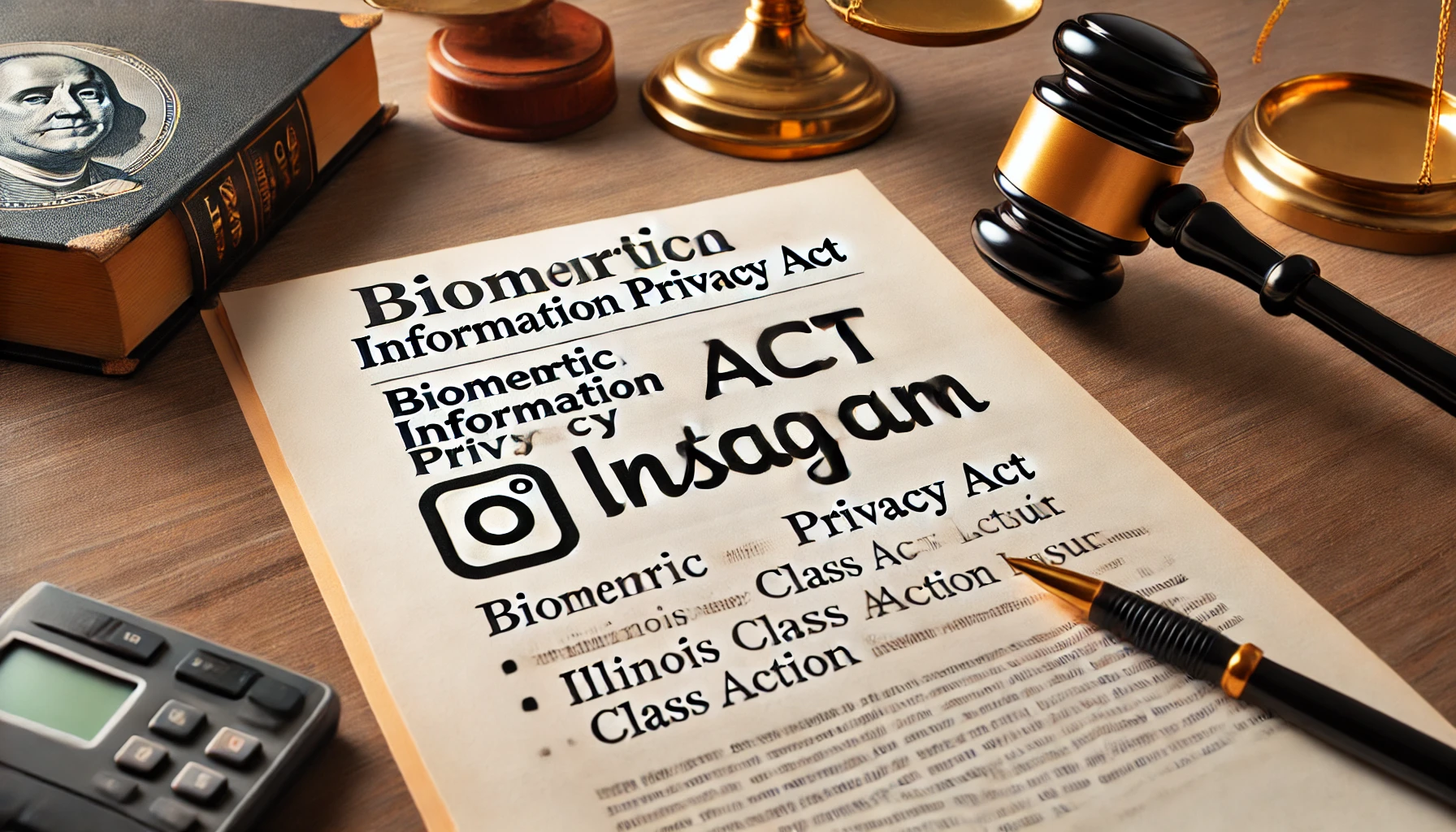Illinois Instagram Class Action Lawsuit: Understanding the $68.5 Million Settlement and Its Impact
The Illinois Instagram class action lawsuit is a significant legal case that highlights the importance of protecting biometric data in the digital age. This lawsuit, filed against Meta Platforms, Inc. (the parent company of Instagram), accused the social media giant of violating Illinois’ Biometric Information Privacy Act (BIPA).
The allegations stated that Instagram collected biometric data, such as facial recognition scans, from users in Illinois without their knowledge or consent. This practice, used for features like automatic photo tagging, was done without providing users with proper notification about how their data was being collected, stored, or used. Under BIPA, companies are required to obtain informed written consent before collecting such sensitive data.
The lawsuit covered a period between August 10, 2015, and August 16, 2023, during which millions of Illinois residents were affected. To resolve the case, Meta agreed to a settlement of $68.5 million, making it one of the largest privacy-related settlements under BIPA.
Eligible Illinois residents who used Instagram during this time were invited to file claims, with the deadline for submissions set as September 27, 2023. Payments to claimants began around June 7, 2024, with each eligible individual receiving approximately $32.56, depending on the number of valid claims submitted.
This case is particularly important because it demonstrates how individuals can use laws like BIPA to hold companies accountable for mishandling sensitive data. It also serves as a wake-up call for businesses to prioritize transparency and compliance with privacy laws. While Meta denied any wrongdoing, the settlement emphasizes the need for stronger data protection practices in the tech industry.
For Illinois residents and social media users everywhere, this lawsuit highlights the importance of understanding your rights and staying informed about how your data is being collected and used.
What is the Illinois Biometric Information Privacy Act (BIPA)?
The Illinois Biometric Information Privacy Act (BIPA) is one of the strictest laws in the United States regarding the collection and use of biometric data. Passed in 2008, BIPA was designed to ensure that individuals’ biometric information—such as fingerprints, retina scans, and facial recognition—is not collected, stored, or shared without explicit permission.
Key aspects of BIPA include:
- Informed Consent: Companies must inform users of what biometric data will be collected and how it will be used before collecting it.
- Written Consent: Businesses must obtain written consent from users before collecting or storing their biometric data.
- Privacy Protections: BIPA also prohibits companies from profiting from biometric data and requires companies to securely handle the data they collect.
- The Right to Sue: If companies violate these rules, individuals have the right to take legal action, which has led to several lawsuits in recent years.
This law stands out because it offers individuals the ability to sue companies for monetary damages in cases where their biometric data is mishandled. Illinois is one of the few states that has such a comprehensive and strict law, and it has set a legal precedent for biometric privacy.
Details of the Lawsuit Against Instagram (Meta Platforms, Inc.)
The class action lawsuit against Instagram was filed in Illinois, with the central issue being Instagram’s use of facial recognition technology. The lawsuit alleged that Instagram collected biometric data from its users—specifically, facial recognition data—without obtaining the proper consent required by BIPA.
Instagram, over time, used this biometric data for various features, such as automatically tagging users in photos. However, the plaintiffs argued that Instagram did not inform users of how their data was being collected or how it would be used, nor did it obtain their written consent before using the technology.
The lawsuit covered a period from August 10, 2015, to August 16, 2023, during which the alleged illegal data collection occurred. The case represented millions of Illinois residents who were impacted by Instagram’s practices during that time.
Settlement Details
To avoid the lengthy and costly litigation process, Meta Platforms, Inc. agreed to settle the class action lawsuit for $68.5 million. The settlement funds were earmarked to compensate Illinois users whose biometric data had been collected by Instagram without their consent.
Eligibility for the settlement was restricted to residents of Illinois who used Instagram during the relevant period. A key part of the settlement process was the claims submission, where individuals had to file claims to receive compensation. The following dates were important to keep in mind:
- September 27, 2023: The deadline to submit a claim for compensation.
- June 7, 2024: The expected date for payments to be distributed to eligible claimants.
This settlement has drawn attention not only because of the amount involved but also because it highlights how legal action can force companies to take responsibility for their data collection practices.
Compensation to Claimants
Eligible individuals who submitted claims were set to receive financial compensation from the settlement. The exact amount each claimant would receive depended on several factors, including the total number of claims submitted and the administrative costs of processing them. However, most eligible claimants were expected to receive around $32.56 each.
While the amount of compensation may seem small, the significance of the case lies more in the broader impact it has on data privacy. For many, the lawsuit was seen as a victory for privacy rights, helping to raise awareness about how companies handle sensitive data like biometric information.
Why This Lawsuit Matters
This lawsuit is not just about compensation—it represents a larger movement toward protecting individuals’ privacy in the digital age. Biometric data, such as facial recognition, is incredibly sensitive, and many people are unaware of how often and how extensively it is being used. Without laws like BIPA, companies could freely collect, store, and share this data without informing the individuals whose data they are using.
The case also underscores the need for transparency in how companies collect and handle user data. With social media platforms like Instagram amassing vast amounts of personal information, users need to be empowered to understand how their data is being used and to take action if their rights are violated. This lawsuit has made clear that there are legal avenues for holding companies accountable for privacy breaches.
Meta’s (Instagram’s) Response
Meta Platforms, Inc., which owns Instagram, did not admit to any wrongdoing but agreed to settle the lawsuit to avoid prolonged legal battles. The company denied the accusations of illegally collecting biometric data, but as part of the settlement agreement, it chose to compensate affected users and revise its data privacy policies.
Although the settlement does not constitute an admission of guilt, it has made Meta more mindful of biometric data usage in the future. In addition, Meta has committed to better informing users about how their data is being used, particularly in regard to facial recognition technology. However, this case remains a clear reminder of how important it is for companies to adhere to privacy laws, especially when dealing with sensitive personal information.
Public Reaction and Future Implications
The settlement and lawsuit have had a major impact on the public, especially among Illinois residents who were directly affected. Many individuals expressed relief at receiving compensation, and the case has drawn national attention to the importance of biometric data privacy. This case serves as a wake-up call to other tech companies that they must follow privacy laws or face similar lawsuits.
Looking ahead, this case is likely to inspire further lawsuits under BIPA, as more people become aware of how their biometric data is being collected and used. It could also prompt other states to pass similar laws to protect their residents from unauthorized data collection practices.
Conclusion
The Illinois Instagram class action lawsuit is a landmark case in the fight for digital privacy. While the settlement offers financial compensation to those affected, its true importance lies in the precedent it sets for privacy rights and corporate responsibility. It emphasizes that individuals should be aware of their rights when it comes to personal data and that companies must be transparent about how they collect and use sensitive information.
As technology continues to evolve, privacy laws like BIPA will likely play an increasingly crucial role in protecting consumers from companies that may take advantage of their personal data. This case demonstrates the power of legal action in holding companies accountable and ensuring that privacy protections are respected in the digital age.
FAQs
Who was eligible to file a claim in this lawsuit?
Illinois residents who used Instagram between August 10, 2015, and August 16, 2023, could file a claim.
What type of data was Instagram accused of collecting?
Instagram allegedly collected biometric data, such as facial recognition scans, without proper user consent.
How much compensation could claimants receive?
Most eligible claimants received approximately $32.56, depending on the number of claims filed.
Did Meta admit to any wrongdoing in the settlement?
No, Meta denied all allegations but settled the case to avoid lengthy legal proceedings.
Why is this lawsuit significant?
It highlighted the importance of privacy laws and set a precedent for biometric data protection in the digital age.
Article Recommendations
ATT Data Breach 2024 Lawsuit: How Millions of Customers Were Affected and What’s Next
Lifewave Lawsuit: How the Case is Reshaping Wellness Industry Standards
Arias Agencies Lawsuit: Financial Ramifications and Lessons for Businesses
Smoothstack Lawsuit: Examining the Allegations and Their Impact on Tech Employment Practices





